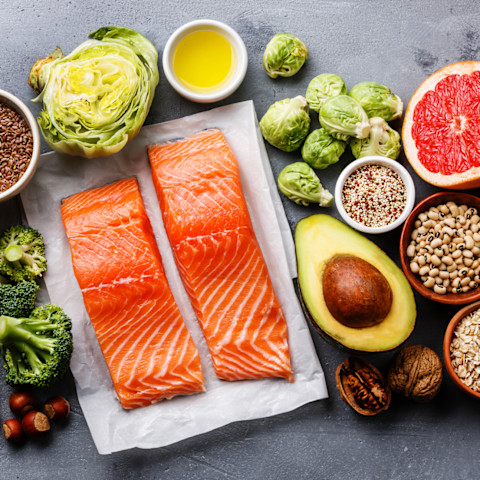If You're Going To Eat One Thing Daily For Your Brain Health, THIS Should Be It

About 20 years ago, when I became seriously ill with chronic fatigue syndrome, I felt like I simultaneously had dementia, depression, and ADD. Eventually, I discovered I suffered from mercury toxicity and was completely exhausted from overworking. My brain health suffered the most. I had terrible brain fog and couldn't focus for long periods of time. Here I was, a physician with brain fog. Some days I couldn't even remember my patients' names.
Even though I wouldn't wish this on anyone, I truly believe that this experience taught me how to be a better physician, and it led me to the world of functional medicine. I finally understood that what we do to our bodies, we do to our brains.

Fixing your brain starts with fixing your body: optimizing all the inputs and taking out the bad influences. The brain is resilient and can recover and heal when given the right support, so today I'm going to give you my top recommendation that you can start using immediately to improve your body and brain.
One reason for the current interest in supporting brain health could be that Alzheimer's is the sixth leading cause of death in the United States and is projected to triple1 in occurrence by 2050. It's interesting to note that the seventh leading cause of death is diabetes, and more than 100 million adults2 in the United States are living with diabetes or pre-diabetes, which could increase by a whopping 54 percent by 20303. We’re finding that these two forms of disease are heavily linked, with Alzheimer's now being called "type 3 diabetes."
Research shows4 that insulin resistance, which I call diabesity, is a major contributor to the brain-damage cascade, causing oxidative damage, cognitive decline, and other types of neurodegeneration. Diabesity occurs from eating too many carbs, too much sugar, and not enough healthy fat. It's a state of chronically elevated insulin, which triggers fat cells to store fat, leading to inflammation and chronic disease, like obesity and diabetes.
The low-fat craze that began in the '60s hurt our health way more than it helped. Flour and refined sugars took the place of fat and in large portions, because eating less fat means feeling hungrier. We became fatter than ever before, increasing the risk5 for type 2 diabetes, high blood pressure, stroke, and all-cause mortality.
So what's the No. 1 thing you can do on a daily basis to support your brain health?
Eat healthy fats.
This topic freaks a lot of people out—won't it make me fat, they wonder. The right kinds will not6, but they will provide powerful healing and support to help you feel your best. That's because 60 percent of your brain is made up of DHA7, an omega-3 fat found in fatty fish, flaxseeds, chia seeds, walnuts, and algae. EPA is another important type of omega-3, and both of these fatty acids are critical for supporting brain function and mood8, regulating metabolism9, and preventing diabetes and inflammation10. Avoid oils like canola, grapeseed, corn, sunflower, and soybean, and be sure to eliminate hydrogenated oils completely, as they contribute to inflammation11 and the progression of disease.

Eating more healthy fats doesn't mean you need to go low-carb. In fact, I suggest eating slow-carb instead. This means you're choosing low-glycemic plant foods that are rich in nutrients and fiber but don't mess with your blood sugar. Dark leafy greens, cauliflower, peppers, onions, asparagus, celery, radishes, mushrooms, blackberries, and blueberries are just some of the many colorful options to get these good kinds of carbs into your diet. As an added bonus, eating healthy fats with these types of foods helps you absorb more of the essential fat-soluble vitamins A, D, E, and K.
In my personal experience, I found that even though I was already eating a healthy diet rich in vegetables, embracing more of the right kinds of fat—like avocado, nuts, seeds, olive oil, and even saturated ones, like coconut oil and grass-fed meat—pushed my mental clarity through the roof.
So what does this kind of diet look like? I like to start my day with a Green Machine Smoothie that includes brain-boosting fats like avocado and coconut milk, along with nutrient-dense spinach, hemp seeds, and matcha green tea. For lunch, I often make a big Fat Salad, topping arugula with wild-caught salmon, walnuts, fennel, cucumbers, olive oil, balsamic, and sea salt for a savory and filling plate of greens. Dinner could be a large, colorful plate of non-starchy roasted veggies, a small portion of sweet potato or squash, and some roasted chicken, grass-fed steak, or turkey meatballs.
There are so many delicious ways to incorporate more good fats into your diet. Focus on whole, real foods from high-quality sources, and you'll quickly notice the amazing benefits in your body and brain.
Ready to learn more about how brain fog and your diet are intimately connected? Register now for our FREE Functional Nutrition Webinar with Dr. Mark Hyman, where you'll learn how to banish that brain fog for good.

Dr. Mark Hyman is a practicing family physician and an internationally recognized leader, speaker, educator, and advocate in the field of Functional Medicine. He is the founder and director of The UltraWellness Center, the Head of Strategy and Innovation of the Cleveland Clinic Center for Functional Medicine, a 13-time New York Times best-selling author, and Board President for Clinical Affairs for The Institute for Functional Medicine. He is the host of one of the leading health podcasts, The Doctor’s Farmacy. Dr. Hyman is a regular medical contributor on several television shows and networks, including CBS This Morning, Today, Good Morning America, The View, and CNN. He is also an advisor and guest co-host on The Dr. Oz Show.
More from the author:
Functional Nutrition Training
Check out Functional Nutrition Coaching
A cutting-edge nutrition deep dive taught by 20+ top health & wellness experts
Learn moreMore from the author:
Functional Nutrition Training
Check out Functional Nutrition Coaching
A cutting-edge nutrition deep dive taught by 20+ top health & wellness experts
Learn more
Dr. Mark Hyman is a practicing family physician and an internationally recognized leader, speaker, educator, and advocate in the field of Functional Medicine. He is the founder and director of The UltraWellness Center, the Head of Strategy and Innovation of the Cleveland Clinic Center for Functional Medicine, a 13-time New York Times best-selling author, and Board President for Clinical Affairs for The Institute for Functional Medicine. He is the host of one of the leading health podcasts, The Doctor’s Farmacy. Dr. Hyman is a regular medical contributor on several television shows and networks, including CBS This Morning, Today, Good Morning America, The View, and CNN. He is also an advisor and guest co-host on The Dr. Oz Show.
11 Sources
- https://www.cdc.gov/aging/aginginfo/alzheimers.htm
- https://www.cdc.gov/media/releases/2017/p0718-diabetes-report.html
- https://www.ncbi.nlm.nih.gov/pmc/articles/PMC5278808/
- https://www.ncbi.nlm.nih.gov/pmc/articles/PMC2769828/
- https://www.cdc.gov/healthyweight/effects/index.html
- https://www.ncbi.nlm.nih.gov/pubmed/12566139
- https://www.ncbi.nlm.nih.gov/pubmed/20329590
- https://www.ncbi.nlm.nih.gov/pubmed/17392137
- https://www.ncbi.nlm.nih.gov/pubmed/23317405
- https://www.ncbi.nlm.nih.gov/pubmed/12480795
- https://www.ncbi.nlm.nih.gov/pmc/articles/PMC3247279/
